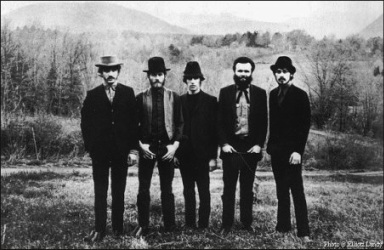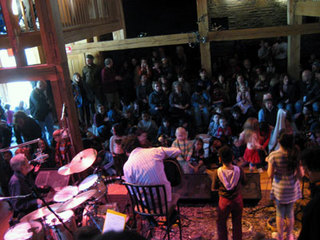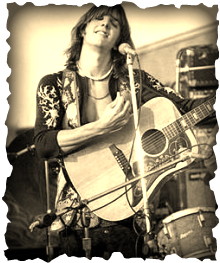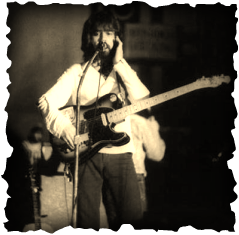The Band (so named because they were always "the band" to various front men), which in their heyday consisted of Canadians Rick Danko (bass guitar, double bass, fiddle, trombone, vocals), Garth Hudson (keyboard instruments, saxophones, trumpet), Richard Manuel (piano, drums, baritone saxophone, vocals), Robbie Robertson (guitar, vocals), and American Levon Helm (drums, mandolin, guitar, vocals).
The Band first came together as they joined rockabilly singer Ronnie Hawkins' backing group, The Hawks, and then as Levon and the Hawks, and then Bob Dylan recruited the group for his U.S. tour in 1965 and a world tour in 1966 and then as a backing group for recordings. The Band emerged on their own after the landmark “Music from Big Pink” album in 1968. A rustic and roots sound that influenced multiple generations of musicians right into the present day. Their songs were contained in a timeless space that spoke of North American history and mythical archetypal themes in a musical context of a blending of folk, country, blues, jazz, rock, and even Cajun music.
By the turn of 21st century the Band consisted of three living survivors --Levon Helm, Garth Hudson, and Robbie Robertson. (albeit one [Levon] suffering from throat cancer and left unable to sing). Garth remained an able backing musician by this time, but slipped from the limelight after the 1990s sans Robertson version of the Band wound down (after releasing three respectable but no-longer groundbreaking albums). Robbie, always the chief songwriter in the Band (and chief ego) made a brief splash with a solo 80s glossy U2-Gabriel-Lanois sound, but his true originality seemed to require the interaction of the other Bands members.
The Band first came together as they joined rockabilly singer Ronnie Hawkins' backing group, The Hawks, and then as Levon and the Hawks, and then Bob Dylan recruited the group for his U.S. tour in 1965 and a world tour in 1966 and then as a backing group for recordings. The Band emerged on their own after the landmark “Music from Big Pink” album in 1968. A rustic and roots sound that influenced multiple generations of musicians right into the present day. Their songs were contained in a timeless space that spoke of North American history and mythical archetypal themes in a musical context of a blending of folk, country, blues, jazz, rock, and even Cajun music.
By the turn of 21st century the Band consisted of three living survivors --Levon Helm, Garth Hudson, and Robbie Robertson. (albeit one [Levon] suffering from throat cancer and left unable to sing). Garth remained an able backing musician by this time, but slipped from the limelight after the 1990s sans Robertson version of the Band wound down (after releasing three respectable but no-longer groundbreaking albums). Robbie, always the chief songwriter in the Band (and chief ego) made a brief splash with a solo 80s glossy U2-Gabriel-Lanois sound, but his true originality seemed to require the interaction of the other Bands members.
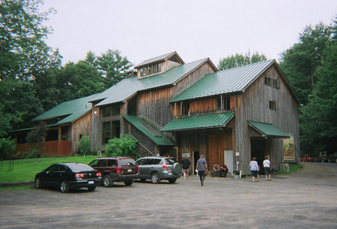
By the early 2000s Levon had recovered enough to begin drumming again at his “Midnight Ramble”, at his home and studio, "the Barn" in Woodstock, New York. These concerts, featuring Helm and a variety of musical guests, have allowed Helm to raise money for medical bills and to resume performing after his nearly career-ending bout with cancer.
Initially, Helm only played drums and relied on guest vocalists at the Rambles, but Helm's singing voice grew stronger and is vocal input grew at his Ramble Sessions.
Below is Levon discussing the Rambles and his return to recording:
In the summer of 2007, I road-tripped to one of the Midnight Rambles in Woodstock. It was strictly a BYOB affair in which coolers and communal food were on tables in Levon’s garage. Pre-show I found myself playing with Levon’s dog and sharing a beer with Nick Lowe (you never know what musicians will appear at one of these things). It felt like a family picnic and the 150 or so other guests were friendly and shared food and good cheer very easily. The merely a “family picnic feeling spell” was broken when I was waiting to use Levon’s bathroom and noticed pictures of him with Dylan on the wall. The music of the ramble itself was sinuous, rustic, and pulsated to the beat that connects all moments in time. It felt like a musical history lesson.
Levon also takes the ramble on the road and here is a clip from a road show:
But-- see him at his Woodstock home if you can—that setting can’t be beat!
FYI--Levon’s daughter Amy also has a Band (Ollabelle) –which opened the ramble show—and they are quite good:
0 Comments
I am late to the game here ---just getting into Gram's and Clarence's music about six or so years ago.....better late than never. This music surely transcends time and musical genres--both putting country in country rock (or the "cosmic" in Cosmic American Music," as Gram liked to say). Both musicians are known for their stints in later day configurations of the Byrds (Gram--1968; Clarence--1968-73). They actually both played on the landmark "Sweetheart of Rodeo" album (with Clarence only as a "session" player). They were kindred souls whose paths often crossed --and sadly both died far too young and tragically in the same year of 1973. A well told story is Gram telling his manager Phil Kaufman at Clarence's funeral that he wanted to be cremated and his ashes spread in the desert . Clarence did die shortly after and to fulfill Parsons' funeral wishes, Kaufman and a friend stole his body from the airport and in a borrowed hearse drove it to Joshua Tree where they attempted to cremate it by pouring five gallons of gasoline into the open coffin and throwing a lit match inside.
A less told story of the two music giants is related in the Ben Fong-Torres' Gram Parsons bio, Hickory Wind:
"Gram and Emmylou (Harris) were preparing for a trial, three-date tour set up by Warner Bros. Records. The idea was to have a caravan of country acts -- Country Gazette, the Kentucky Colonels, and Gram and Emmylou. Gene Parsons, by now a solo artist on Warner, along with Chris Ethridge and Sneaky Pete (Kleinow), completed what the label billed as a traveling 'country rock festival.'
With so much talent on board, the stage was bound to be overcrowded, and at one of the shows -- the one in Annapolis, Maryland -- it was. It was the electric set, the highlight of a day-long show. It was after midnight when Gene, Chris, and Sneaky Pete, joined by Clarence White, climbed onto the stage with Gram and Emmylou.
As Gene recalled it, the song had reached the place where White would take his solo break. Clarence was considered by his peers the best country guitar player going and he was not a great admirer of Gram. The word was that he'd been considered for The Byrds in 1968 when Gram got the job.
Now here was Gram playing to the crowd by motioning for Clarence to turn down his volume. If Gram was no longer sashaying like Mick Jagger, he was still putting on superstar airs. Soon, he was motioning for the whole band to turn it down, even confiscating Gene's drumsticks, leaving him to play with his hands.
When Clarence stopped playing his solo, Gram didn't appear to notice. All he knew was that the crowd seemed to enjoy his antics. Clarence picked up again and finished his solo and the electric set ended. But the show continued backstage.
Clarence, who was almost a foot shorter than Gram, grabbed him by the neck, pulled him off to one side, and shouted: 'Listen, you son of a bitch, I've played more country music than you've ever played and I know more about it than you'll ever know! Just remember: You're not the only fucking star around here!'
Gram talked back, but without much energy or conviction. It was nearly three in the morning and through a haze of drink and drugs, Gram managed to understand that he had been out of line. His southern manners came back and he managed an apology. 'I didn't mean to offend,' he said."
The star line coming from Clarence is funny--in that you could not have met a man with a reputation for being more humble than Clarence. Clarence accepted Gram's apology and they became close friends.
Below is Clarence singing the song Gram sang at his funeral.
A less told story of the two music giants is related in the Ben Fong-Torres' Gram Parsons bio, Hickory Wind:
"Gram and Emmylou (Harris) were preparing for a trial, three-date tour set up by Warner Bros. Records. The idea was to have a caravan of country acts -- Country Gazette, the Kentucky Colonels, and Gram and Emmylou. Gene Parsons, by now a solo artist on Warner, along with Chris Ethridge and Sneaky Pete (Kleinow), completed what the label billed as a traveling 'country rock festival.'
With so much talent on board, the stage was bound to be overcrowded, and at one of the shows -- the one in Annapolis, Maryland -- it was. It was the electric set, the highlight of a day-long show. It was after midnight when Gene, Chris, and Sneaky Pete, joined by Clarence White, climbed onto the stage with Gram and Emmylou.
As Gene recalled it, the song had reached the place where White would take his solo break. Clarence was considered by his peers the best country guitar player going and he was not a great admirer of Gram. The word was that he'd been considered for The Byrds in 1968 when Gram got the job.
Now here was Gram playing to the crowd by motioning for Clarence to turn down his volume. If Gram was no longer sashaying like Mick Jagger, he was still putting on superstar airs. Soon, he was motioning for the whole band to turn it down, even confiscating Gene's drumsticks, leaving him to play with his hands.
When Clarence stopped playing his solo, Gram didn't appear to notice. All he knew was that the crowd seemed to enjoy his antics. Clarence picked up again and finished his solo and the electric set ended. But the show continued backstage.
Clarence, who was almost a foot shorter than Gram, grabbed him by the neck, pulled him off to one side, and shouted: 'Listen, you son of a bitch, I've played more country music than you've ever played and I know more about it than you'll ever know! Just remember: You're not the only fucking star around here!'
Gram talked back, but without much energy or conviction. It was nearly three in the morning and through a haze of drink and drugs, Gram managed to understand that he had been out of line. His southern manners came back and he managed an apology. 'I didn't mean to offend,' he said."
The star line coming from Clarence is funny--in that you could not have met a man with a reputation for being more humble than Clarence. Clarence accepted Gram's apology and they became close friends.
Below is Clarence singing the song Gram sang at his funeral.
